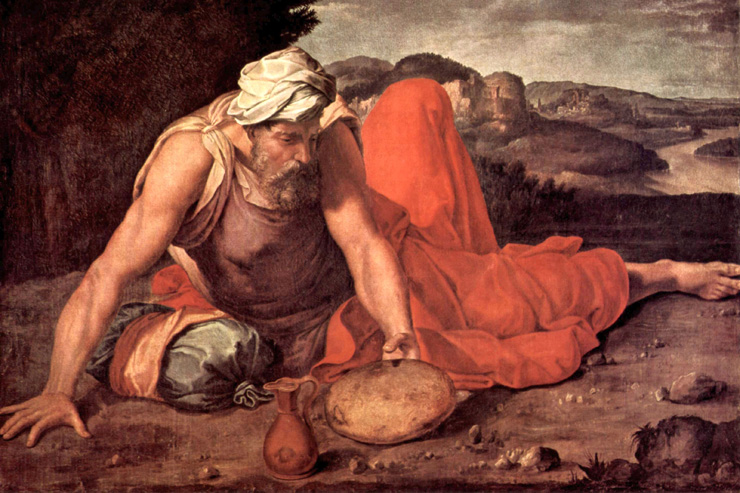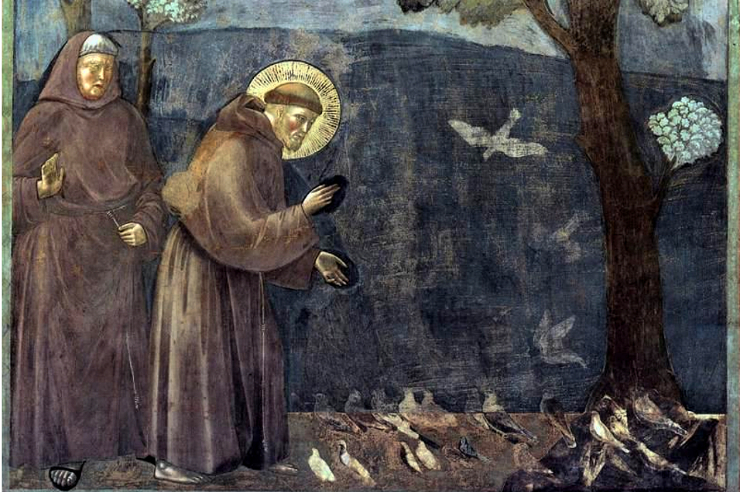Today’s first reading might be a familiar one. This week we’ve been following glimpses of the story of Elijah, and today we find him having fled the murderous designs of Jezebel. He is taking shelter in a cave when the Lord passes by. There is wind, there is an earthquake and there is fire – but the Lord is not in these magnificent signs. Then there is a “tiny, whispering sound.” When Elijah hears this, he hides his face in his cloak, knowing that this is the Lord passing by (1 Kgs 19:12-13).
It’s important to note where Elijah is. He’s not on Mount Carmel, where he had his showdown with the false prophets of Baal in the previous chapter. (If you haven’t read that epic story in 1 Kg 18:16-39, you need to do so- it’s wonderful.) He’s not on some random mountain, either. The Book of Kings specifically tells us: At the mountain of God, Horeb.
Why is this important? Because earlier in the Scriptures, a similar scene occurred at Mount Horeb, or Sinai (Exodus 19). There God’s theophany during the giving of the law to Moses was accompanied by thunder and lightning. The earth trembled, and the mountain was “completely enveloped in smoke, because the Lord had come down upon it in fire” (Ex 19:18). Elijah is on this same mountain, and yet has a very different experience of God’s presence. He experiences all those same signs, but realizes that the Lord is speaking to him in the stillness.
The story of Elijah is not meant to tell us that God doesn’t ever speak in spectacular signs. Sometimes God does speak to us in grand ways. In the previous chapter, he made his presence known through a dramatic miracle of fire. We might also consider the scene at Pentecost, when the Holy Spirit’s coming was accompanied by a violent wind and fire. Even today, he can speak to us in dramatic ways. This can require our faith just as much as when he speaks in small ways. Do we have the faith that he still intervenes in human history? Do we have the faith that he loves us enough to use spectacular means to get our attention?
But other times he speaks to us in small ways. This too requires our faith. Do we write things off as coincidences or meaningless, when he is really showing his love in small things? Of course, there’s a danger in always looking for the voice of the Lord in this sign or that. There can be a preoccupation in trying to decipher meaning in this occurrence or that incident. Instead, we should remain close to the Lord – speaking to him daily in prayer – and have confidence that he will help us see him when he comes.
Sometimes we need fire and earthquakes and drama. Other times we don’t. The Lord knows us, He knows our heart, and He knows what we need.
The Israelites needed the drama of Mount Carmel and the defeat of the prophets of Baal. Their ancestors needed the spectacle of earthquakes and lightning on Mt Sinai. Elijah recognized the Lord in the silence. God could have come in the earthquake and he could have come in the lightning. He had done it before, and He might do it again. But he came in the silence. And Elijah recognized him. He knew him. He had a relationship with him, and so he was able to recognize his presence when he came.
Instead of chasing signs and wonders, we need to stay close to him in daily prayer, knowing that he is always with us. Whether we feel his presence or not, he is there. If we cultivate a life of daily communication with him, we won’t need to worry about deciphering signs. We will recognize him, as Elijah knew him in the stillness.
Most importantly, we should remember that our greatest encounter with the Lord is a dramatic encounter that merits lightning and fire… but comes in stillness. It is an earth-shattering miracle that is not accompanied by the shaking it deserves. It is a life-changing encounter that happens in almost routine. The Holy Spirit descends on the altar, but there is no fire. The Lord does not just pass by, but comes to dwell… and yet there is no rushing wind.
The Lord waits for us in the Eucharist. We have a far more intimate encounter with Him than the prophet Elijah, when we take his flesh and blood into our own. Do we know him in the stillness? Do we spend our days looking for signs, or do we kneel down in worship before the Lord, who waits for us in the tabernacle or in that monstrance?
















